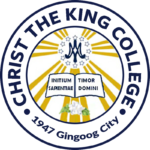RVM Pedagogy
RVM PEDAGOGY
The RVM Pedagogy is a way in which teachers journey with the learners towards their integral development and growth as productive citizens through interactive learning processes that lead to the realization of learning goals, unfolding of learning standards, and eventual demonstration of learning outcomes.
The theory of constructivism is applied considering:
- the context of learners, their uniqueness, background, culture, experiences, and willingness and readiness to learn and demonstrate learning outcomes;
- the nature of the learning process where the learning environment is created for learners to experience active social, collaborative, and cooperative engagement and are encouraged to ask critical and reflective questions and make their conclusions. Expanded opportunities and direct learning experiences are faithfully provided to enable learners to move away from the normal curve and achieve a higher level of learning;
- the role of teachers as active facilitators, mentors, coaches, and consultants who have the responsibility of engaging learners in a creative and dynamic dialogue to raise the level of expectations for the latter to acquire knowledge, develop their skills connect the meaning of concepts to real-life experiences and demonstrate learning outcomes in a real-life context.
Learners are encouraged to engage in purposeful, critical, and reflective inquiries to give deeper meaning and significance to long-lasting ideas presented and to make meaningful, creative, and functional connections and application of their knowledge and skills in varied real-life situations including the shaping of their values system and enriching their faith-life experiences.
Moreover, teachers are required to have a clear focal point in their sustained, and thought-provoking interaction with students through the utilization of connecting, exploring, and leading inquiries to develop students’ critical, logical, creative, investigative, analytical, and reflective thinking. This interaction also gives learners more opportunities to uncover and discover deeper the concepts presented thereby allowing them to gain more meaningful insights and connections that enable them to demonstrate successfully the desired learning outcomes.
These purposeful, reflective, and critical inquiries are intended to essentially include the four-pronged integration of:
- Ignacian core and related values
- meaningful connections of concepts to contemporary social realities
- concepts across subject boundaries
- Biblical texts reflection in relation to the concepts taught
Likewise, these integrations clearly reflect the transformative process because within the lesson proper FAITH AND LIFE DIALOGUE is experienced.
